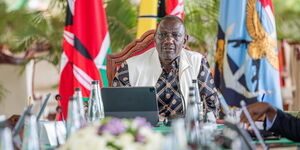Central Organisation of Trade Unions-Kenya (COTU-K) Francis Atwoli revealed on Friday, February 28, that he will not sue Martha Karua over using the colour purple to symbolise the People’s Liberation Party (PLP), her newly launched party.
While speaking to the media, Atwoli noted that Karua’s choice to use purple, which is also COTU-K’s national colours, would have no ramifications on the trade union, citing that trade unions are bigger than political parties.
Even so, Atwoli revealed that the process to seek legal redress over Karua’s use of colour purple had already kicked off, but further deliberations on the matter led to COTU taking a new direction over the issue.
According to him, filing a lawsuit would have enhanced Karua’s visibility and popularity, resulting in COTU giving the veteran politician free airtime and coverage in the media.
“We have a letter pertinent to that, but after weighing out (the options), we have said that sometimes, when we get in seriously, we will be building Martha Karua for nothing. We will make her appear as if she can create an impact on the Kenyan masses as far as Kenyan politics is concerned,” Atwoli remarked.
“COTU is bigger than all political parties in this country because COTU is represented here both locally and internationally,” he added.
Atwoli’s comments came a day after Karua launched her new party in a lavish ceremony at the party’s headquarters in Nairobi. The ceremony attracted notable leaders such as former Deputy President Rigathi Gachagua, Wiper Party leader Kalonzo Musyoka, and Democratic Alliance Party-Kenya (DAP-K) leader Eugene Wamalwa.
This was after a rebrand from the previous National Rainbow Coalition-Kenya (NARC), which she had led since 2009. The rebrand saw the ‘Flower Party’ change its colours from red, white, and green to lilac, white, and purple.
Other changes saw the party’s symbol change to a purple rose from a rose flower. The changes would also see the party rewrite its slogan to 'Unite, Liberate' from 'One Kenya, One Nation, One People'.
The changes, especially in colour, led netizens to draw parallels between Karua’s PLP and COTU-K’s colours over the similar use of purple.
As of the latest available information, there is no public record indicating that COTU has officially trademarked the color purple. However, COTU has historically associated itself with the color purple and has taken actions to protect this association.
This became particularly prevalent when, in 2016, COTU threatened legal action against Machakos Governor Alfred Mutua for using purple during the launch of his Maendeleo Chap Chap movement. COTU's lawyer stated that the colour purple is synonymous with the union and its usage by the political movement could create an impression of affiliation.
While a trade union in Kenya can sue a political party for using colors similar to its own, the success of such a case would depend on several factors, including intellectual property rights, the potential for public confusion, and the specific legal claims made.
Regarding the registration of colours as trademarks in Kenya, the Trademarks Act allows for trademarks to be limited to specific colours. Section 19(1) of the Act states that a trademark may be limited to one or more specified colors, and this limitation is considered when determining the distinctive character of the trademark.
However, the Act does not explicitly list colour as a registrable mark, leading to debates on whether a colour alone can be trademarked. The prevailing view is that for a colour to be registered as a trademark, it must have acquired a distinctive character uniquely associated with a particular entity or product.
In the lead-up to the launch, Karua explained that her decision to rebrand was informed by PLP’s broader strategy to resonate more with the Generation Z (Gen Z) demographic, which is expected to play a greater role in the upcoming 2027 general elections.












